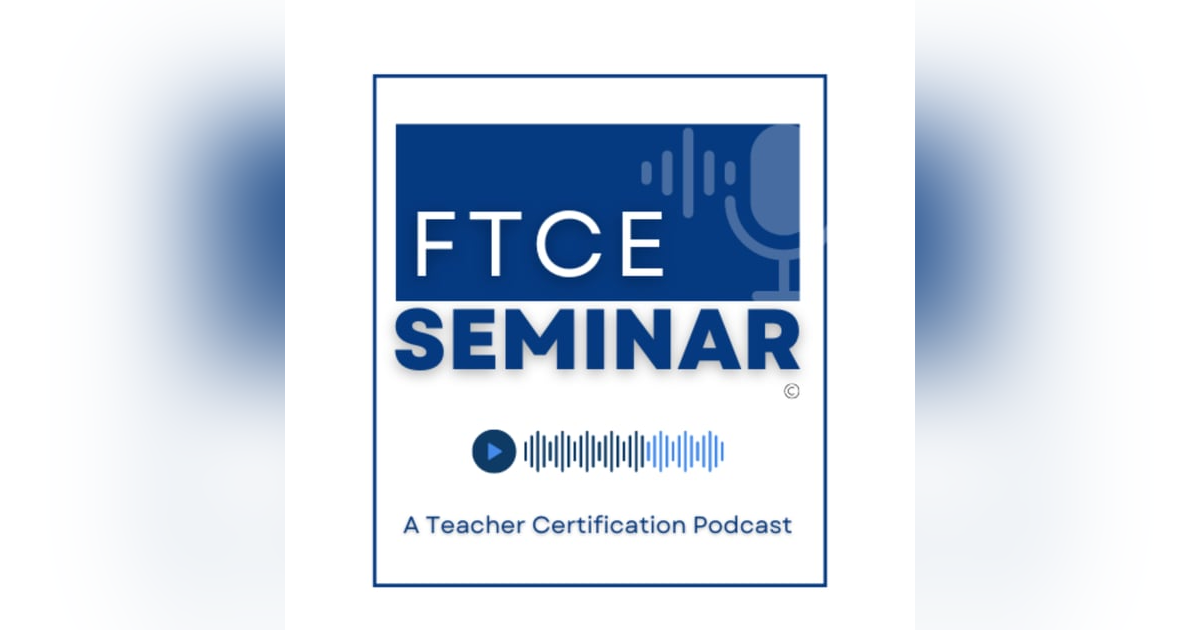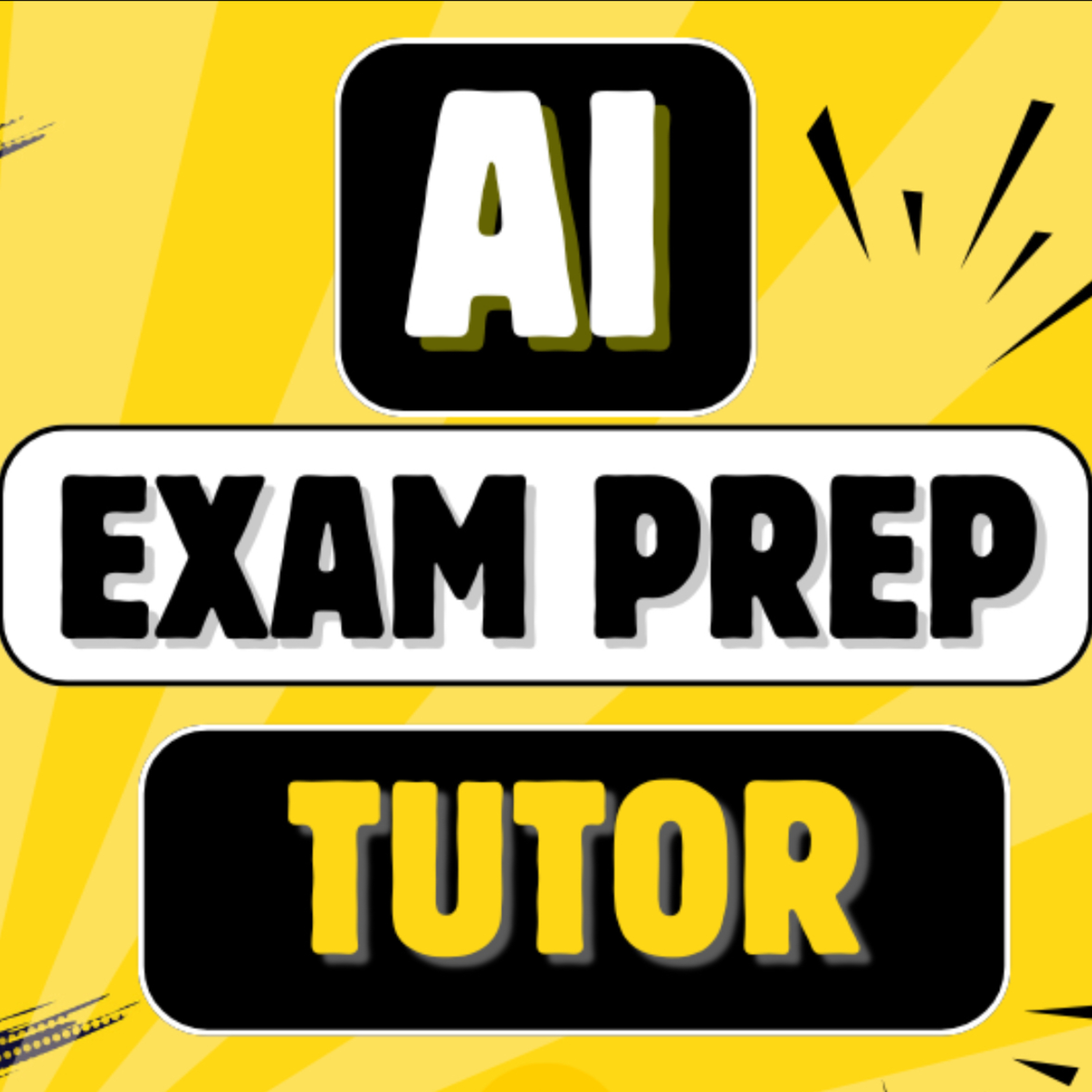E30: FTCE | GK Reading | Analyzing Multiple Texts
E30: Teacher Certification Podcast | FTCE | Reading | Analyzing Multiple Texts
In today’s episode, I’ll be talking about the FTCE General Knowledge Reading Subtest. This is part 9 of a multi-series review of what YOU need to know to pass the Reading section of the GK.About FTCE Seminar
How do you PASS the Florida Teacher Certification Exams (FTCE)? On this podcast, we will be discussing concepts from the FTCE Testing Blueprint to help you prepare for the exam. ..Not only is each episode based on the FTCE General Knowledge essay subtest, English Language Skills subtest, Reading subtest, and Mathematics subtest, but I am also using my experience as a FTCE Tutor, 10 year classroom teacher who has passed the FTCE GK Exam, FTCE Professional Education Exam, FTCE Exceptional Student Education Exam, FTCE English 6-12 Exam, FTCE Journalism Exam, and the Reading Endorsement to help you pass and start teaching. ..How do educational podcasts work? Each podcast covers one concept from the FTCE Testing Blueprint. This method is called micro-learning where you listen repeatedly to concepts to reinforce your knowledge and understanding. Try it out! Check it out! And leave your questions and comments below.
-----------------------------------------------
RESOURCES (Free)
💢 FTCE/FELE https://www.fl.nesinc.com/
💢 FTCE Seminar Websitehttps://www.ftceseminar.com/
💢 FTCE Podcasting Study Guides @ TpTStudy Hacks Podcast Guide.
-----------------------------------------------
RESOURCES (For Purchase)
⚡️ FTCE Podcasting Study Guides @ TpT
- FTCE GK Essay Prep
- FTCE GK English Language Skills Prep
- FTCE GK Reading Prep
- FTCE GK Math Prep
⚡️ FTCE Test Prep Books @ Amazon
- General Knowledge Exam https://amzn.to/3QQrCrv
- Professional Education Exam https://amzn.to/4aHwuql
- Elementary Education Exam https://amzn.to/3WN5FNX
- Exceptional Student Education Exam https://amzn.to/3V5CLY0
- *As an Amazon Associate I earn from qualifying purchases made via links which provide a small commission to this channel and accompanying website.
-----------------------------------------------
Support and Donations
💟This podcast and channel are listener supported, contributions can be made at:https://www.buymeacoffee.com/ftceseminar
You can subscribe to the FTCE Seminar Podcast at www.ftceseminar.com
------------------------------------------------
#FTCE #teachercertification #teachers #education #podcast #educationalpodcast #certification #mathprep #professionaleducation #englishprep #essayprep #generalknowledge #teachertraining #exam #test #motivation #study #studyhacks #english #reading #maths #teachereducation #assessment #testtakingstrategies #readings #mathpreparation #englishgrammar #exammotivation #exampreparation #overthinking #practicetests #motivational #testanxiety #readingcomprehension
--- Support this podcast: https://podcasters.spotify.com/pod/show/ftceseminar/support0:00:00
Welcome to episode 30 of FTCE seminar, Teacher Certification Podcast. I'm your host, Mercedes Musto. In today's episode, I'll be talking about the FTCE general knowledge reading subtests. This is part nine of a multi-series review of what you need to know to pass the reading section of the GK.
0:00:18
Today, we're going to talk about analyzing multiple texts. What? You mean like reading two passages at the same time? Well, yeah, but not at the same time. You're so dramatic. Today is a great day to really own and apply those reading strategy skills that you've learned about in the last few episodes. You know what? You got this because you are amazing.
0:00:45
Concept number 1, analyzing multiple texts. Let's put it this way. On the exam, you'll be asked to compare and contrast two passages. And you know how to do this because you've been applying your word detective skills. When you evaluate the two passages, you'll be using your summarizing skills like in episode 25,
0:01:06
you're identifying the author's tone and purpose skills from episodes 27 and 28, and your ability to identify stated claims like in episode 29. You can revisit these episodes at any time to review these skills. In addition to previous episodes, there are several ways to analyze multiple passages.
0:01:27
Three common ways are to identify the mode, genre and author's craft. Let's take a look at each of them to add these reading skills to our toolbox. Number one, mode definition. The mode gives us a category for the writing. Four common types of modes are expository, persuasive, descriptive and narrative. Example.
0:01:50
Now remember back to other episodes, expository texts are informational. They explain a topic. You will find expository texts in a nonfiction genre. More about genres next. What are some types of nonfiction informational text? Well, I mean, think about it, but not too long.
0:02:11
If you said science articles, history books, and academic literature, then you are correct. Persuasive texts are easy to spot because they're trying to convince you. Types of persuasive texts are, they can come in the form of essays, editorials, advertisements, brochures.
0:02:29
I mean, in fact, we can find the art of persuasion everywhere. Descriptive text literally and figuratively describe a topic. Even though we use colorful adjectives and adverbs in lots of writing, you will find brilliant imagery in descriptive writing as the author tries to paint a picture in your mind with words. See what I did there? Now, here's one we haven't talked about much in previous episodes, narrative texts.
0:02:57
You will notice a narrative text because it can be true or fictional, and it's a story. A story is being told. Well, how do you know it's a narrative? Because narratives have story elements like a problem or plot with characters, settings, conflict, and resolution. Also, narrative writing can be of the fiction or nonfiction genre.
0:03:20
So let's talk about genres. Number two, genre. Definition. Identifying the genre is another way to categorize text. Popular genres include fiction, nonfiction, poetry, and gosh, you could really get descriptive and go into science fiction, dramas, fairy tales, folklore, and on and on. Reading tip, genre is a quick way to compare multiple texts.
0:03:48
Number 3, author's craft. Definition, the author's craft is generally how the author used all of these literary elements to create a story. Did you notice how several elements overlapped? For example, an author could blend mode and genre to create a descriptive science fiction novel or an expository historical memoir. Or let's see, how about a persuasive, dramatic first person narrative? You're like, Mercedes, what's the point?
0:04:13
building reading strategy skills this whole time and now you'll be able to scan and summarize multiple texts with confidence. While scanning the text be thinking to yourself what is the mode? Expository? Persuasive? Narrative? What is a genre? Is it fiction or nonfiction? Next, ask yourself how has the author crafted this piece? This is where tone, purpose, and the blend of mode and genre all fit together. Evaluating text is like taking a word puzzle apart, looking at the individual pieces, then putting it all together with finesse. Let's try a short example. Passage A. There are several reasons why fresh ground coffee
0:05:09
tastes more flavorful than pre-ground coffee. See, when you grind coffee, it increases the surface area of the coffee, releasing the oils, flavor, and aroma of the deliciously roasted beans. And that's a good thing for coffee goers. But the same thing that makes a fresh grind also means that the coffee is now more susceptible to environmental factors like air and moisture, causing the coffee to taste stale over time. And that's why I prefer fresh ground coffee. Quick, what's the mode and genre of this passage? Hmm, if you said persuasive nonfiction,
0:05:48
then you are correct. The author stated a claim and was trying to convince you of their views on fresh versus pre-ground coffee. Passage B. According to the National Coffee Association, the history of coffee has many legendary origins. Stories can be traced back to the plateaus of Ethiopia, 15th century coffee shops in the Arabian Peninsula, and by the 17th century, coffee was the morning beverage in Europe.
0:06:13
Coffee shops quickly became known as the schools of the wise and penny universities for their dark, dark stimulating beverages and engaging conversations. Well, that was kind of interesting. Quick, what is the mode and genre of the passage? Hmm, did you say expository nonfiction? You are correct. Here the author is sharing historical information. Let's apply our knowledge of the author's craft to both texts.
0:06:41
Okay, hmm, the topic of both texts is, well, it's coffee. However, the purpose of passage A is to convince, and the purpose of passage B is to explain. However, both texts use an informative tone to craft their message. Well, there you have it. Let's review. Remember that you can use all your reading strategies
0:07:09
when analyzing two text passages. In this episode, we cover mode, genre, and author's craft. Being able to apply reading strategies will help you with every portion of the general knowledge test because reading is involved. How cool is that? For more practice with reading strategies, visit ftceseminar.com to study for the test. The important thing is to start studying and start studying today so you can pass the teacher certification exam.
0:07:36
Well, what are you waiting for? Subscribe to us on Spotify, Apple Podcasts, YouTube, or wherever you get your podcasts. This podcast was recorded at the Pickens Multimedia Studio at the University of West Florida. This podcast is listener supported. Contributions can be made via the listener support link on Spotify. This is your host, Mercedes Musto. FTCE seminar, a teacher certification podcast so you can pass the FTCE.
Transcribed with Cockatoo














